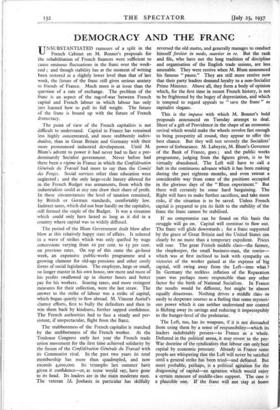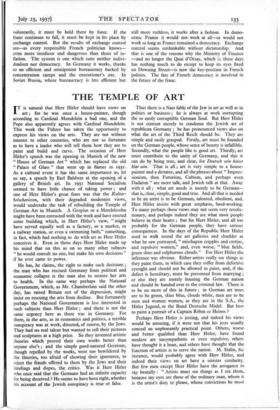DEMOCRACY AND THE FRANC
UNSUBSTANTIATED rumours of a split in the French Cabinet on M. Bonnet's proposals for the rehabilitation of French finances were sufficient to cause ominous fluctuations in the franc over the week- end ; and though stability has at the moment of writing been restored at a slightly lower level than that of last week, the future of the franc still gives serious anxiety to friends of France. Much more is at issue than the question of a rate of exchange. The problem of the franc is an aspect of the tueof-War ' between French capital and French labour in whiCh labour has only just learned how to pull its full weight. The future of the franc is bound up with the future of French democracy.
The point of view of the French capitalists is not difficult to understand. Capital in France has remained less highly concentrated, and more stubbornly indivi- dualist, than in Great Britain and Germany with their more pronounced industrial development. Until M. Blum's advent to power it had never had to face a pre- dominantly Socialist government. Never before had there been a regime in France in which the Confederation Generale du Travail had more to say than the Comite des Forges. Social services other than education were neglected ; and the only large-scale luxury allowed for in the French Budget was armaments, from which the industrialists could at any rate draw their share of profit. In these circumstances the level of taxation remained, by British or German standards, comfortably. low. Indirect taxes, which did not bear hardly on the capitalist, still formed the staple of the Budget. It was a situation which could only have lasted 'as long as it did in a country where capital was so widely diffused. • The period of the Blum Government dealt blow after blow at this relatively happy state of affairs. It ushered in a wave of strikes which was only quelled by wage concessions varying from 16 per cent to 15 per cent. on previous rates. On top of this came the 4o-houi week, an expensive public-works programme and a growing clamour for old-age pensions and other costly forms of social legislation. The employer, large or small, no longer master in his own house, saw more and more of his profits swallowed up in shorter hours and better pay for his workers. Soaring taxes, and more stringent measures for their collection, were the last straw. • The answer to the strike of labour was a strike of Capital, which began quietly to flow abroad. M. Vincent Auriol's clumsy efforts, first to bully the defaulters and then 'fo win them back by kindness, further sapped cOnfidenCe. The French authorities had to face a steady and per- sistent, if unspectacular, flight from the franc.
The stubbornness of the French capitalist is matched by the stubbornness of the French worker. At the Toulouse Congress early last year the French trade union.movement for the first time achieved solidarity by the fusion of the Confederation Generale du Travail with its Coniniunist rival. In the past two years it total membership has more than quadrupled, and now exceeds 4,000,000. Its -triumphs laSt summer have given it confidenceor, as some would say, have One to its head. Its leaders are in the: Main moderate men: The veteran 111. Jouhaux in particular has skilfully reversed the old motto, and generally manages to conduct himself fortiter in- modo, suaviter in re. But the rank and file, who have not the long tradition of discipline and organisation of the English trade unions, are less amenable. They were restive when M. Blum• announced his famous " pause." They are still more restive now that their party leaders demand loyalty to a non-Socialist Prime Minister. Above all, they form a body of opinion which, for the first time in recent French history, is not to be frightened by the bogey of depreciation, and which is tempted to regard appeals to " save the franc " as capitalist slogans.
This is the - impasse with which M. Bonnet's bold proposals announced on Tuesday attempt to deal. Short of a gift of Providence in the shape of an economic revival which would make the wheels revolve fast enough to bring prosperity all round, they appear to offer the best chance. But they will test severely the Socialists! power of forbearance. M. Labeyrie, M. Blum's Governor of the Bank of France, goes ; and the public works programme, judging from the figures given, is to be virtually abandoned. The Left will have to Jean • a halt in the continuous advance which it has been making during the past eighteen ¶months, and even retreat a considerable way from some of the positions occupied in the glorious days of the " Blum experitnent." But there will certainly be some hard bargaining. The Right will have to make further sacrifices,' and take more risks, if the situation is to be saved. Unless French capital is prepared to pin its faith to the stability of the franc the franc cannot be stabilised.
If no compromise can be found on this basis the .
struggle will go on. Capital will continue to flow (Mt The franc will glide downivards ; for a franc supported by the giace of Greai Britain and the Uthied Statei can clearly be no more tban a temporary expedient. PriceS will soar. The great French middle class—the firmer, the shopkeeper, the small business-man, the rentier--- which was at first inclined to look with sympathy on victories of the worker gained at the expense of big capital, will swing away from the Left—into what ? In Germany the reckless inflation of the Reparation years was perhaps more -responsible -than any other factor for the birth Of National Socialism. In France the results -would be different, but might be 'almost equally disastrous. Nothing' drives: a: Middle clitSs so easily to desperate courses as a feeling that some mysteril ous power which it can neither understand nor control is filching away its savings and reducing it imperceptibly to the hunger-level of the proletariat.
The Left, too, has its weapons, if it is not dissuaded from using them by a sense of responsibility—which its leaderS indubitably poisess—to France as a :whole. Defeated in the political arena, it may revert_ to the pre- War doctrine of the syndicaliits tht labour can only beat capital by economic pressure. Already in F'rante some people are whispeting that the Left will never be satisfied
until a general strike has been tried-:L-and defeated. But .
more probable; perhdps,_ political agitation for the dragooning of capital—an agitation . which would enjoy a certain measure of middle-class support. The case is a plausible one: If the franc will not 'stay at home voluntarily, it must be held there by force. If the franc continues to fall, it must be kept in its- place by exchange control. But the results of exchange control are—as every responsible French politician knows— even more -insidious and dangerous than those of in- flation. The system is one which suits neither indivi- dualism nor democracy. In. Germany it works, thanks to an efficient and omnipotent bureaucracy backed by concentration camps and the executioner's axe. In Soviet- Russia, where bureaucracy is less efficient but still more ruthless, it works after a fashion. In demo- cratic France it would not work at all—or would not work so long as France remained a democracy. Exchange control seems unthinkable without dictatorship. And that is one of the reasons why the Ministry of Finance —and no longer the Quai d'Orsay, which L.,. these days has nothing much to do except to keep its eyes fixed on Downing Street—is now the key-position in French politics. The fate of French democracy is involved in the future of the franc.































































 Previous page
Previous page